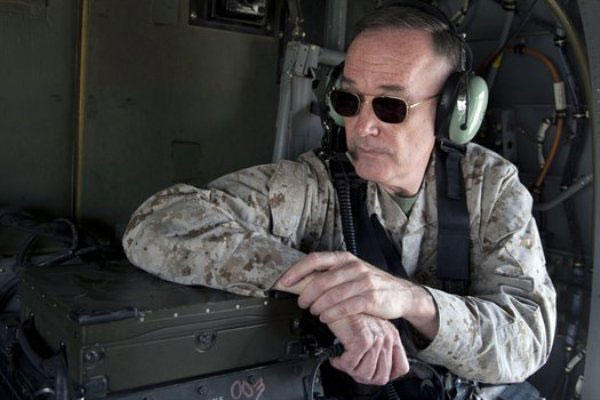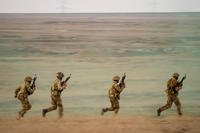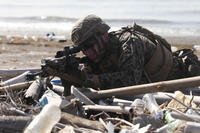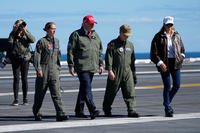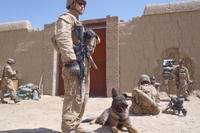Joint Chiefs Chairman Gen. Joseph Dunford was in Iraq last week to gauge the fallout from the Iran-Saudi Arabia rift on the campaign against ISIS to include the potential for increased risk to U.S. troops.
Rep. Mac Thornberry, R-Texas, chairman of the House Armed Services Committee, echoed Dunford's concerns. The Sunni-Shia Muslim divide at the core of the severing of relations between Shia Iran and Sunni Saudi Arabia had far-reaching consequences for the region, "including for our troops," Thornberry said Sunday on C-Span's "Newsmakers" program.
Dunford said that, "To the extent that sectarianism is a source of instability, clearly we are concerned about the announcement Saudi Arabia is breaking off relations with Iran. We're looking pretty hard at what the implications are of this decision."
"The challenge in the Middle East that has gotten the most attention has been ISIL," Dunford said, using another acronym for the Islamic State group, Stars and Stripes reported. "But clearly the sectarian challenges in the Middle East were there before ISIL, and those are the ones highlighted by the announcement of Saudi Arabia breaking off relations with Iran."
Dunford spoke in Germany on the first leg of a week-long trip that also took him to Turkey, where he pressed for closing of the border with Syria to ISIS foreign fighters, and to Iraq, where he visited with U.S. troops at the Al Asad airbase west of Ramadi in Anbar province.
Dunford also joined U.S. Ambassador Stuart Jones for talks in Baghdad with Prime Minister Haider al-Abadi, who has offered with no success so far to mediate between Iran and Saudi Arabia.
The Iran-Saudi dispute has particular resonance in Shia-majority Iraq, where Iran's influence is reflected in its support of the so-called Popular Mobilization Forces (PMF) in the fight against ISIS.
The estimated 3,500 U.S. troops in the train, advise and assist mission have been barred from contact with the PMF, and Abadi, who is Shia, notably kept the PMF and other Shia units out of the operation to retake Ramadi for fear of losing U.S. and coalition air support.
Dunford told reporters traveling with him that the Iraqi Security Forces, and the U.S. troops advising and training them, were "pumped up" about the progress in Ramadi and elsewhere in Iraq but the Sunni-Shia tensions could impact morale.
Sunni tribal fighters trained by the U.S. were mainly held out of the Ramadi offensive, but were expected to provide policing and security in areas cleared of ISIS. The main fighting was done by the Iraqi "counter-terror" units, which received lengthier training from the U.S. and report directly to Abadi.
One of those Dunford met with at the Combined Joint Operations Center in Baghdad was Gen. Talib Shegati al-Kenan, the Iraq Counter Terrorism Service Director.
The ISF leadership "was pretty proud of their guys" after Ramadi, Dunford said. "They feel it in terms of pressure on ISIL, and they realize they have to keep moving to provide that pressure. They are kind of pumped up about it."
Dunford also said the ISF was becoming better at coordinating with U.S. airstrikes. "It's not just about using aviation and waiting until it's done," he said. "It's about using aviation as a cover so they can move and fire and clear. They are better able to integrate effects."
The long-running Iran-Saudi rift widened when the Saudis carried out 47 executions in a single day earlier this month, including that of outspoken Shia cleric Nimr al-Nimr. Demonstrators attacked the Saudi embassy in Tehran and the Saudis broke off relations with Iran.
Iran and Saudi Arabia issued threats and counter-threats over the weekend. Saudi Foreign Minsiter Adel al-Jubeir said at a news conference in the United Arab Emirate that, "We are looking at additional measures to be taken if it (Iran) continues with its current policies."
In a letter to United Nations Secretary General Ban Ki-moon, Iranian Foreign Minister Mohammad Javid Zarif warned of continuing Saudi "provocations."
Zarif charged that "most members of al-Qaida, the Taliban, and the al-Nusra front [in Syria] are Saudi citizens or have been brainwashed by demagogues wielding oil money."
Pentagon Press Secretary Peter Cook said twice last week that the dispute between the Saudis and Iranians has had "no effect thus far" on the campaign against ISIS, but Defense Secretary Ashton Carter went to the State Department on Friday to confer with Secretary of State John Kerry on the impact for the region.
Kerry won agreement last month in Vienna from the Saudis, the Iranians and the international community to convene a peace conference later this month on ending the civil war in Syria.
"That long shot just got a lot longer," Philip Jones, a Brookings Institute Senior Fellow and former White House adviser on the Mideast, said last Monday of the prospects for peace in Syria in a telephone conference with reporters.
-- Richard Sisk can be reached at richard.sisk@military.com.
